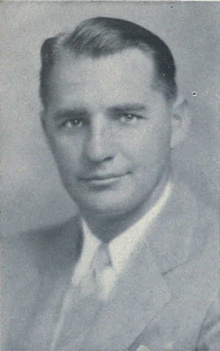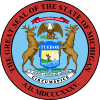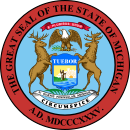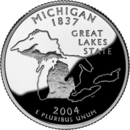Portal:Michigan
The Michigan Portal  Michigan (/ˈmɪʃɪɡən/ MISH-ig-ən) is a state in the Great Lakes region of the Upper Midwest region of the United States. It borders Wisconsin to the southwest in the Upper Peninsula, and Indiana and Ohio to the south in the Lower Peninsula; it is also connected by Lakes Superior, Michigan, Huron, and Erie to Minnesota and Illinois, and the Canadian province of Ontario. With a population of nearly 10.12 million and an area of 96,716 sq mi (250,490 km2), Michigan is the 10th-largest state by population, the 11th-largest by area, and the largest by area east of the Mississippi River. Its capital is Lansing, and its largest city is Detroit. Metro Detroit is among the nation's most populous and largest metropolitan economies. The name derives from a gallicized variant of the original Ojibwe word ᒥᓯᑲᒥ (mishigami), meaning "large water" or "large lake". Michigan consists of two peninsulas. The Lower Peninsula resembles the shape of a mitten, and comprises a majority of the state's land area. The Upper Peninsula (often called "the U.P.") is separated from the Lower Peninsula by the Straits of Mackinac, a five-mile (8 km) channel that joins Lake Huron to Lake Michigan. The Mackinac Bridge connects the peninsulas. Michigan has the longest freshwater coastline of any political subdivision in the United States, being bordered by four of the five Great Lakes and Lake St. Clair. It also has 64,980 inland lakes and ponds. Michigan has the second-most water area of any state, behind only Alaska. The area was first occupied by a succession of Native American tribes over thousands of years. In the 17th century, French explorers claimed it as part of the New France colony, when it was largely inhabited by Indigenous peoples. French and Canadian traders and settlers, Métis, and others migrated to the area, settling largely along the waterways. After France's defeat in the French and Indian War in 1762, the region came under British rule. Britain ceded the territory to the newly independent United States after its defeat in the American Revolutionary War. The area was part of the larger Northwest Territory until 1800, when western Michigan became part of the Indiana Territory. Michigan Territory was formed in 1805, but some of the northern border with Canada was not agreed upon until after the War of 1812. Michigan was admitted into the Union in 1837 as the 26th state, a free one. It soon became an important center of industry and trade in the Great Lakes region, attracting immigrants in the late 19th and early 20th centuries from many European countries. Immigrants from Finland, Macedonia, and the Netherlands were especially numerous. Migration from Appalachia and of Black Southerners as part of the Great Migration increased in the 1930s, with many settling in Metro Detroit. Although Michigan has developed a diverse economy, in the early 20th century it became widely known as the center of the U.S. automotive industry, which developed as a major national economic force. It is home to the country's three major automobile companies (whose headquarters are all in Metro Detroit). Once exploited for logging and mining, today the sparsely populated Upper Peninsula is important for tourism because of its abundance of natural resources. The Lower Peninsula is a center of manufacturing, forestry, agriculture, services, and high-tech industry. (Full article...) Entries here consist of Good and Featured articles, which meet a core set of high editorial standards.
Madonnaland: And Other Detours in Fame and Fandom is a non-fiction book written by American essayist and musician Alina Simone. It is a biography of American singer Madonna, as well the author's own analysis of music and pop culture. Upon its release on March 3, 2016 by University of Texas Press, Madonnaland received positive reviews from critics, who praised her writing and bold subject choice. Rolling Stone magazine listed it as one of the 10 Best Music Books released in 2016. Consisting of six chapters, Madonnaland finds Simone visiting Madonna's birthplace, Bay City, Michigan, where she spoke with the local people about the singer. The book also analyses Madonna's career and fame, with the author delving into her own music career and obscure Bay City bands. Simone had been initially commissioned to write a new biography about the singer. However, due to already available excess content on her, the author felt she would not be able to find anything new. Instead, she ended up writing Madonnaland about her own failure to create a Madonna biography, why Bay City did not have any commemoration for the singer, as well as unknown music bands, pop culture and celebrity life. (Full article...) Selected picture - Sylvania Wilderness is an 18,327-acre (74 km2) area of land located a few miles west of Watersmeet, Michigan. The area is located entirely within the bounds of the Ottawa National Forest, and is currently being managed as a wilderness area as part of the National Wilderness Preservation System by the U.S. Forest Service. Did you know -
Related portalsSelected article - Ford Motor Company (commonly known as Ford) is an American multinational automobile manufacturer headquartered in Dearborn, Michigan, United States. It was founded by Henry Ford and incorporated on June 16, 1903. The company sells automobiles and commercial vehicles under the Ford brand, and luxury cars under its Lincoln brand. The company is listed on the New York Stock Exchange and is controlled by the Ford family. They have minority ownership but a plurality of the voting power. Ford introduced methods for large-scale manufacturing of cars and large-scale management of an industrial workforce using elaborately engineered manufacturing sequences typified by moving assembly lines. By 1914, these methods were known around the world as Fordism. Ford's former UK subsidiaries Jaguar and Land Rover, acquired in 1989 and 2000, respectively, were sold to the Indian automaker Tata Motors in March 2008. Ford owned the Swedish automaker Volvo from 1999 to 2010. In the third quarter of 2010, Ford discontinued the Mercury brand, under which it had marketed upscale cars in the United States, Canada, Mexico, and the Middle East since 1938. (Full article...) Selected biography -Benjamin Oosterbaan (/ˈoʊstərbɑːn/ OH-stər-bahn; February 24, 1906 – October 25, 1990) was an American football end and head coach for the University of Michigan. He was a three-time All-American college football player, a two-time All-American basketball player, and an All-Big Ten Conference baseball player for the Michigan Wolverines. He is widely regarded as one of the greatest football players in Michigan history. He was selected by Sports Illustrated as the fourth greatest athlete in the history of the U.S. state of Michigan in 2003, and one of the eleven greatest college football players of the first century of the game (ending in 1968). As a head coach Oosterbaan won a national championship with the 1948 Michigan Wolverines football team, by way of the Associated Press. In high school, he had been an All-American basketball player, a state champion in track and field, and an All-State baseball and football player. During his collegiate athletic career he was a Big Ten batting champion in baseball, the Big Ten scoring champion in basketball, and the Big Ten touchdown leader in football. He was the first University of Michigan athlete to become a first-team All-American in basketball and was the first three-time first-team All-American in football. In addition to his All-American collegiate accolades, Oosterbaan threw three touchdown passes in the dedication game of Michigan Stadium on October 22, 1927. (Full article...) General imagesThe following are images from various Michigan-related articles on Wikipedia.
TopicsCategoriesSymbols
Lists
Related pagesWikimediaThe following Wikimedia Foundation sister projects provide more on this subject:
Things you can doDiscover Wikipedia using portals | ||||||||||||||||||||||||||||||||||||












































































